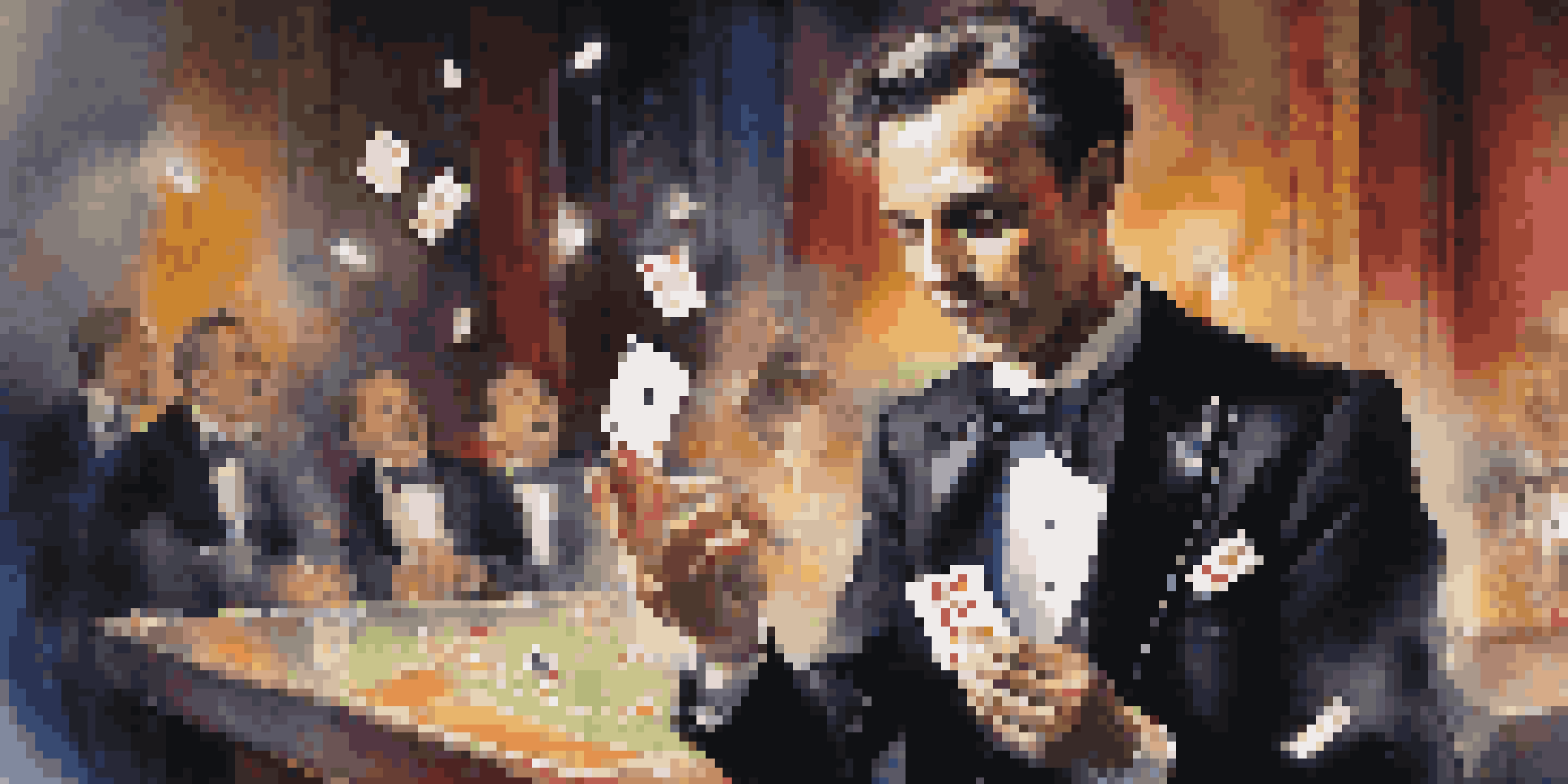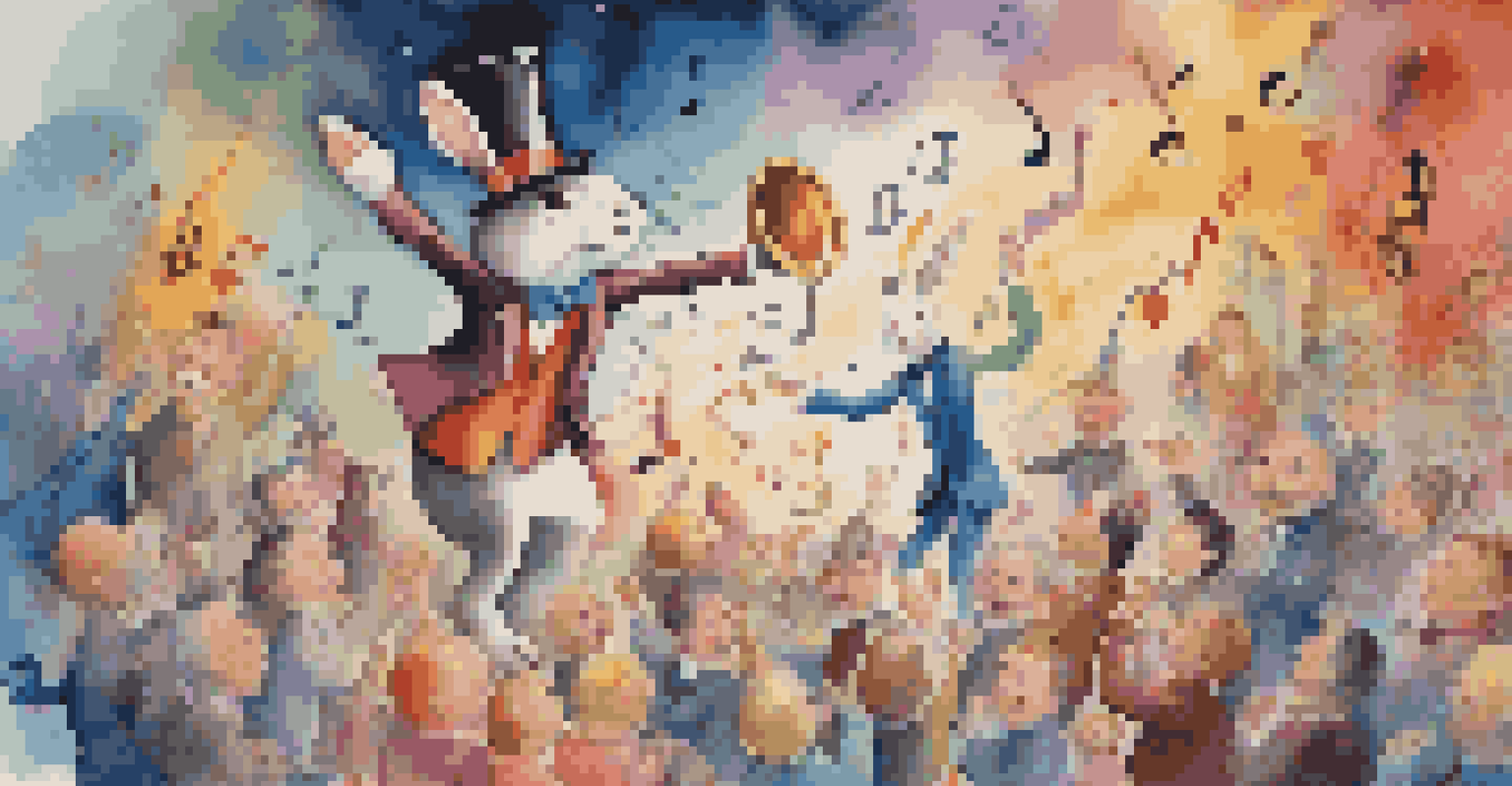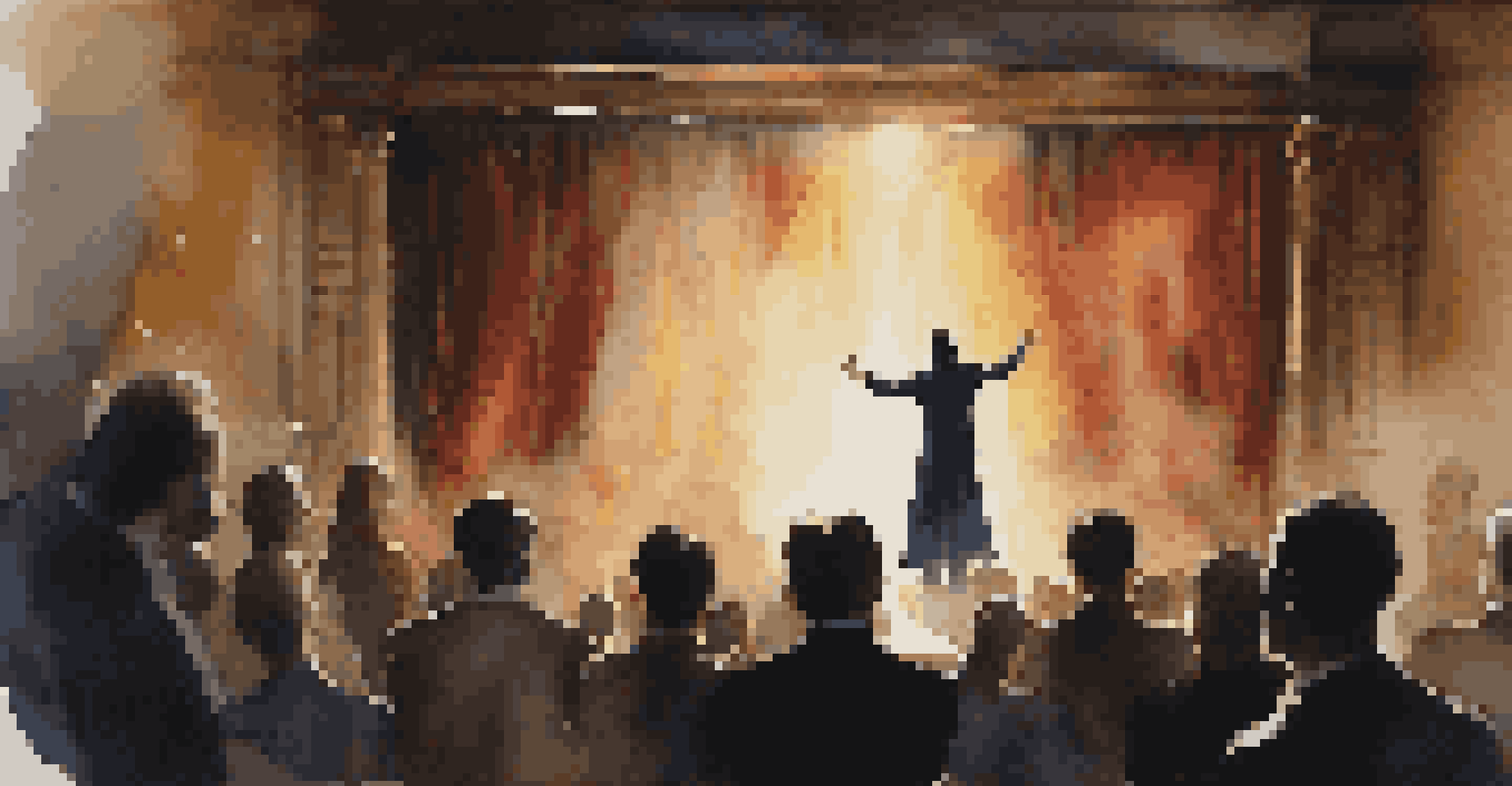The Role of Music in Magic: Enhancing the Performance

The Connection Between Music and Magic
Music and magic share a fascinating relationship, both aiming to evoke emotions and create memorable experiences. Just as a magician captivates their audience with tricks, music sets the mood, drawing viewers deeper into the performance. The seamless blend of visual and auditory elements heightens the sense of wonder, making each illusion even more astonishing.
Music is the shorthand of emotion.
Imagine watching a magician pull a rabbit from a hat while a whimsical tune plays in the background; the music amplifies the surprise and delight of the moment. This synergy between sound and spectacle not only entertains but also engages the audience on multiple sensory levels. Ultimately, this connection transforms a simple trick into an unforgettable experience.
Moreover, music can help establish the magician's brand, enhancing their unique style and persona. From dramatic orchestral scores to upbeat pop tunes, the choice of music can communicate a magician's character and approach, setting the stage for what’s to come.
Setting the Mood with Music
One of the key roles of music in magic is its ability to set the mood and atmosphere. Whether it's a suspenseful score that builds tension before a grand reveal or a lighthearted melody that makes the audience laugh, music can significantly influence how a trick is perceived. The right soundtrack creates an emotional backdrop, allowing the audience to feel more connected to the performance.

For instance, consider a magician performing a haunting illusion in a dimly lit room—an eerie, slow melody can enhance the feeling of suspense and intrigue. As the audience listens, they're not just watching; they're experiencing the magic, which leads to a more profound impact. In this way, music serves as an invisible thread that ties the audience's emotions to the performance.
Music Enhances Emotional Connection
The right soundtrack can evoke powerful emotions, deepening the audience's engagement with the magic performance.
Additionally, music can help manage the pacing of a performance. A well-timed crescendo can signal an upcoming climax, while a sudden silence can heighten anticipation, leaving the audience on the edge of their seats.
Creating Suspense and Surprise
Suspense is a crucial element in both magic and music, and together, they create moments of breathtaking surprise. A magician often relies on timing and misdirection, while music can enhance these techniques by controlling the audience's expectations. By strategically using musical cues, performers can lead their audience down one path, only to reveal a surprising twist.
Magic is the art of making the impossible possible.
Take, for example, a classic disappearing act. As the magician prepares to make an object vanish, a sudden shift in the music can signal an unexpected moment, catching the audience off guard. This combination of auditory and visual elements heightens the surprise factor, making the trick more memorable.
Furthermore, composers often craft pieces specifically for magic shows, tailoring the music to align with the performance's narrative. This collaboration allows for greater emotional resonance, creating a fully immersive experience for the audience.
Music as a Storytelling Tool
Music is a powerful storytelling device, and when paired with magic, it can elevate the narrative of a performance. A well-chosen soundtrack can add depth to the magician's story, painting vivid imagery and guiding the audience through an emotional journey. Each note can convey a feeling, turning a simple trick into a captivating tale.
For instance, a magician might perform a routine themed around lost love, using a melancholic melody to evoke a sense of longing. As the audience listens, they're not just watching; they're engaging with the story, investing emotionally in the outcome. This connection makes the performance resonate on a personal level.
Setting the Mood with Sound
Music plays a crucial role in establishing atmosphere, influencing how tricks are perceived and experienced by the audience.
Additionally, music can help establish a seamless flow between different acts in a magic show. By using transitions that align with the narrative, performers can create a cohesive experience that keeps the audience engaged from start to finish.
Enhancing the Performance with Rhythm
Rhythm plays a vital role in both music and magic, creating a sense of timing and flow that can enhance a performance. Just as musicians rely on beats to guide their playing, magicians use rhythmic patterns to time their tricks and movements. This synchronization ensures that each element of the act aligns perfectly, captivating the audience.
For example, a magician may perform a card trick to a fast-paced rhythm, matching their movements to the beat. This creates a dynamic and energetic atmosphere, making the performance feel more alive. The audience becomes swept up in the rhythm, increasing their engagement and excitement.
Moreover, rhythmic elements can help emphasize key moments in a performance. A sudden pause followed by an upbeat tempo can create an exhilarating climax, leaving the audience thrilled and eager for more.
Using Music to Build Character
In the world of magic, a performer's character is crucial to their success, and music is a vital tool for establishing that persona. The right soundtrack can reinforce a magician's identity, whether they aim to be whimsical, mysterious, or dramatic. By selecting music that aligns with their style, performers can create a memorable presence that resonates with the audience.
For instance, a magician who incorporates humor into their act might choose lighthearted, playful tunes to enhance their comedic timing. This choice not only complements their personality but also invites the audience to engage with them in a fun and entertaining way. Music becomes an extension of the magician's character, making their performances more cohesive.
Rhythm Unifies Performance Elements
Rhythmic patterns in music synchronize with a magician's movements, enhancing the flow and excitement of the act.
Additionally, music can help create a signature sound that audiences associate with a specific performer. This unique musical identity can become a recognizable aspect of their brand, drawing in fans and creating a lasting impression.
The Emotional Impact of Music in Magic
At the heart of every great performance lies emotion, and music plays a pivotal role in evoking those feelings. The right soundtrack can stir nostalgia, joy, or even sadness, allowing the audience to connect with the performance on a deeper level. This emotional engagement is what transforms a good magic show into a truly unforgettable experience.
Consider a closing trick that features a powerful, uplifting piece of music. As the magician reveals their final surprise, the audience is not only amazed but also moved, creating a sense of shared joy and wonder. This emotional high can linger long after the performance, leaving a lasting impression.

Furthermore, the emotional impact of music can help foster a sense of community among audience members. As they collectively experience the ups and downs of the performance, they share in the magic, creating a bond that enhances the overall enjoyment.